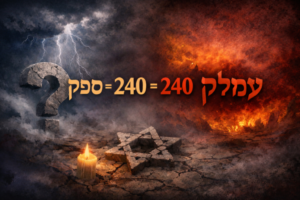- Faith ⬦ Read ⬦ Shabbat ⬦ Weekly Torah Portion
Everyone has his own “truth” – Parshat Acharei-Mot – Kedoshim
There is a familiar phrase that people like to repeat: “Everyone has his own truth.” We also have our own truth. Let us explore if there is any truth to this statement. Perhaps, the intention is that having one’s own “truth” gives him the freedom of expression to fabricate lies. And what does this sentence have to do with us and this week’s parsha? This is what our weekly lesson will address.
This week we read two Torah portions, Acharei-Mot and Kedoshim, which are combined together into one reading. In Parshat Acharei-Mot, the Torah warns against indecent behavior and following after the “chukim” (laws or ways) of the nations who behaved in this manner: “Do not follow in the ways of the land of Egypt in which you dwelt, and do not follow in the ways of Canaan to which I am taking you. Do not walk in their statutes. Carry out My laws and safeguard My decrees to follow them; I am Hashem your G-d. Observe My statutes and My laws, which a man should carry out and live by them. I am G-d” (Leviticus 18:3-5).
Beyond the inherent meaning of setting boundaries and providing for discipline, a “chok” means: a belief in something that cannot be understood. It means accepting an obligation without any reason or logic. The system of mishpat (a different word for “law”) does follow the rules of logic. The word “chukim” (the plural for chok), on the other hand, conveys the meaning of making something binding without giving any reason or logical explanation. Rashi mentions a few examples of chukim: the prohibition of wearing shatnez (garments made of both wool and linen), eating pork, and the laws of the Red Heifer.
Let’s look unwaveringly at the truth: Is it possible to believe in something that cannot be understood? We are Jews of faith, but how can we believe in something that the intellect cannot grasp? Is the Torah commanding us to act irrationally?
We need to understand the matter of having faith in something we cannot understand.
When we are required to believe in something we do not understand, it means that we rely on the concept of truth. Once we have come to recognize truth, and when faith is based on absolute Truth, we can rest assured that our faith will be a true and correct faith. That is to say that when a person is connected to the Absolute Truth, he will only search for truth, and he will be able to use this truth to come to true faith.
However, if a person thinks that he is on the path of truth, but his motive behind his “truth” is that he is looking for honor or has a desire for money or physical passion, this “truth” will have an influence on him, and he will develop a distorted faith around his own desires. Then not only will his faith not lead him on the true path, but on the contrary, it will give him an otherworldly sense of validity that will reinforce his negative inner motives, and at which point, it will be almost impossible for him to return to the true path.
When we are required to believe in something we do not understand, it means that we rely on the concept of truth.
Why is what one bases his faith on so important? And what happens when a person develops an ego-based faith as we described?
When someone makes a mistake about what the truth is, we can still correct him and show him what his mistake was. It is possible to correct him and make him realize that he erred. But this will not be an easy task at all. Everyone knows how hard it is to make even the smallest change in someone’s conception of the truth, but it is still within the realm of possibility.
However, when a person makes his truth—which is based on his own negative desires—into a new kind of faith, he basically turns it into a “new religion,” feeling so strongly about his beliefs that he gives them a kind of heavenly aura, as if G-d Himself came down and gave him this new faith, and he feels that that his beliefs are completely legitimate. Go try to argue with someone like this and prove to him that he is right or wrong. It’s no longer a matter of what the truth is—it has become a matter of faith. There is no one to talk to! There is no way to refute his falsifications and distortions, for he will always roll his eyes and say, “This is what I believe. Even if you were to prove to me a thousand times that I am wrong, it wouldn’t matter to me. This is my faith!”
And just as a reminder: his faith is based on the “truth” of his own desires, falsehood, illusions, desire for honor, and so on.
This is what the Torah warns us: “Do not follow in the ways of the land of Egypt in which you dwelt, and do not follow in the ways of Canaan to which I am taking you. Do not walk in their statutes.” The Torah reveals to us that the reason that the Egyptians and the Canaanites behaved the way they did was because of their desires. Clear and simple! This is the whole reason why they invented their laws to begin with: it gave legitimacy to their crude behavior and gave them the freedom to enjoy their degenerate lifestyle and to do whatever they wanted.
The Torah informs us that following their ways will inevitably also lead to believing in their laws—believing in their “values” and later on, legitimizing their indecency and deplorable behavior.
What is the remedy for this? The Torah continues: “Carry out My laws and safeguard My decrees to follow them; I am Hashem your G-d.” Only the chukim (laws) which G-d made are Divine laws, pure and true laws, based on the Creator’s Truth. They are completely refined, without any element of desire for honor, passion, evil, etc. Therefore, the Creator’s chukim (laws) are absolutely True. They form the basis of ethical morality, and as the Torah ends: “Live by them.” The Torah informs us that the only way of achieving a true life is by following the path of Truth. The prophet Habakuk also expressed this idea: “The righteous person shall live though his faith” (Habakuk 2:4), meaning that faith which is based on Truth will bring a person to true life.

Belief based on truth brings man to real life!
So what is the difference between blind faith and moral, ethical faith?
Holy faith in G-d is a faith that is based on the search for Truth which is free from any personal interests. It is the clear-cut Truth. We received the Torah through Moses, and we saw all the signs and wonders that G-d did to the Egyptians: the Ten Plagues, the Splitting of the Sea, and the giving of the Torah in front of 600,000 people. And we also get to see the pleasantness of the holy Torah and taste the sweetness of its Truth.
When we establish our faith on this absolute Truth, despite the fact that we may attain some level of true knowledge, it is still impossible to reach a complete conception of the Creator, for we will always have questions, and there will always be unusual events that we will not be able to explain. It is truly enough that we have the knowledge on which to base our faith and believe in the holy Torah in its entirety, including that which we cannot fully understand. This is the right form of truth, and it will bring us to full faith in G-d. This type of faith is based on the Truth of the Torah, and it is pure, clarified, and free of all desire, interest in honor, etc.
However, when faith is not based on the absolute and clear Truth, let alone when it is founded on distortions which are driven by the desire for authority, the accumulation of capital, control, and other negative forces that unfortunately are not lacking, it will inevitably give rise to a parasitic belief system which our Sages called “emunot cazviot,” false beliefs: the faith of falsehood and lies!
Here is an example of how perverting the truth leads to distorted faith and verging from the righteous path: When Avimelech took Sarah, Abraham’s wife, into his home, G-d told Avimelech in a dream at night: “Behold you are to die because of the woman you have taken; moreover, she is a married woman” (Genesis 20:3). Avimelech tried to justify himself, “In the innocence of my heart and purity of my hands, I did this” (Ibid, 20:5) as if he were the one who was acting properly, and Avraham was the one who acted improperly because he misled him into thinking Sara was his sister. G-d did not agree with what Avimelech said and answered him: “‘I too knew that it was in the innocence of your heart that you did this’” (Ibid, 20:6). Notice that The Holy One’s answer was missing the words “purity of my hands” (Rashi), meaning, that G-d agreed with Avimelech that he acted with innocence of heart, but He reveals that the true motivation was not innocent; rather, it was his desire to sin.
When you merit to the absolute and purified truth, it is possible to establish faith and distance yourself from false beliefs, living a life of true moral value, as the Torah commands: “You shall observe My decrees and all My ordinances, and you shall preform them—I am G-d” (Leviticus 19:37).
(Based on Likutei Halachot, Ribit 5:31-35)
- 0 comment






















